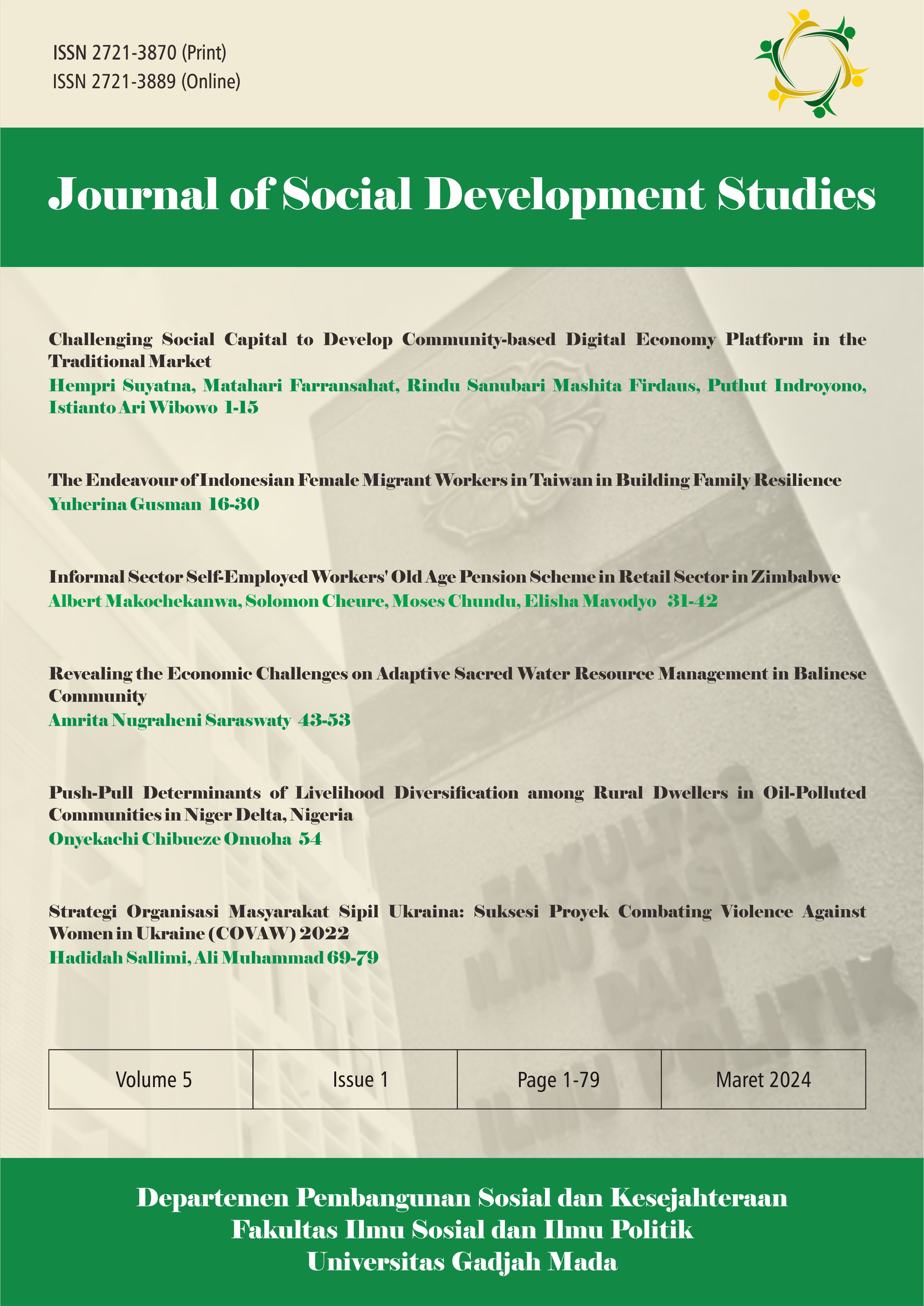Abstract
A private and large corporation typically owns and manages the digital platform, positioning merchants in traditional markets solely as providers of goods. This practice distances merchants from additional advantages offered by the platform and excludes them from the decision-making process. This paper explores the strength of social capital in enhancing opportunities for small economic actors, such as merchants in traditional markets, to benefit from the digital economy through a community-based online market platform, thus overcoming this challenge. Employing a qualitative descriptive research method with a case study approach, data were obtained through interviews, documentation, and focus group discussions. This paper demonstrates that social capital mitigates the challenge of financial capital in leveraging digital economy innovations, enriching the discourse on the interconnectedness between social relations and economic development in community-based settings like traditional markets.
References
Lupton, D. (2014). Digital sociology. Routledge.
Smith, J. W. (2017). Economic Democracy: The Political Struggle of the 21st Century: The Political Struggle of the 21st Century. Routledge.
Pramono, A., Santoso, A., & Indriyono, P. (2011). Menahan Serbuan Pasar Modern: Strategi Perlindungan dan Pengembangan Pasar Tradisional.
Journals:
Handayani, R., Kusumajanto, D. D., & Handayati, P. (2021). Digitalization of trade in traditional markets: causal relationship of digital skills, economic literacy, and financial technology. International Journal of Business, Economics and Law, 24(5), 16-21.
Rahardiani, A. (2018). The Cultural Value Identification of Bandung Traditional Market in the Process of City Development through the Government Revitalization Project Case Study: Astana Anyar and Sumber Hurip Markets, Bandung1. JCCRS JOURNAL OF THE INTERNATIONAL CENTER FOR CULTURAL RESOURCE STUDIES, 4, 1-16.
Journal with DOI:
Agboola, O. P., Azizul, M. F., Rasidi, M. H., & Said, I. (2018). The cultural sustainability of traditional marketplace in Africa: A new research agenda. Journal of Rural Studies, 62(July), 87–106. https://doi.org/10.1016/j.jrurstud.2018.07.001
Buhr, D. (2017). Social Innovation Policy. Social Innovation Policy for Industry 4.0, January 2015, 417–448. https://doi.org/10.1093/oso/9780198830511.003.0016
Cumbers, A. (2019). Economic democracy. Keywords in Radical Geography: Antipode at 50, 102–106. https://doi.org/10.1002/9781119558071.ch18
Fabbrini, S. (2003). Bringing Robert A. Dahl's Theory of Democracy to Europe. Annual Review of Political Science, 6(June), 119–137. https://doi.org/10.1146/annurev.polisci.6.010302.115514
Farransahat, M., Damayanti, A., Suyatna, H., Indroyono, P., & Firdaus, R. S. M. (2020). Pengembangan Inovasi Sosial Berbasis Digital: Studi Kasus Pasarsambilegi.id. Journal of Social Development Studies, 1(2), 14–26. https://doi.org/10.22146/jsds.670
Guery, L., & Pendleton, A. (2016). Do investments in human capital lead to employee share ownership? Evidence from French establishments. Economic and Industrial Democracy, 37(3), 567-591. https://doi.org/10.1177/0143831X14551999
Lee, S. (2017). A study on traditional market decline and revitalisation in Korea: Improving the Iksan Jungang traditional market. Journal of Asian Architecture and Building Engineering, 16(3), 455–462. https://doi.org/10.3130/jaabe.16.455
Leksono, S., Rizalnurfirdaus, & Sungkawati, E. (2019). Revitalisation on the Suprastructure of Traditional Market Institutions. 349(Iccd). https://doi.org/10.2991/iccd-19.2019.24
Purnomo, M., Otten, F., & Faust, H. (2018). Indonesian traditional market flexibility amidst state promoted market competition. Social Sciences, 7(11), 238. https://doi.org/10.3390/socsci7110238
Sahban, H. (2018). Empowerment of Merchants and Traditional Market Potential Development in Indonesia. 3(1), 428–437. https://doi.org/10.31219/osf.io/38f59
Simon, W. H. (2019). Economic Democracy and Enterprise Form in Finance*. Politics and Society, 47(4), 557–571. https://doi.org/10.1177/0032329219880372
Song, Y., Escobar, O., Arzubiaga, U., & De Massis, A. (2021). The digital transformation of a traditional market into an entrepreneurial ecosystem. Review of Managerial Science, 0123456789. https://doi.org/10.1007/s11846-020-00438-5
Summers, J., & Chillas, S. (2021). Working in employee-owned companies: The role of economic democracy skills. Economic and Industrial Democracy, 42(4), 1029–1051. https://doi.org/10.1177/0143831X19835319
Working Paper:
FitzRoy, F., & Nolan, M. (2020). DISCUSSION PAPER SERIES Towards Economic Democracy and Social Justice: Profit Sharing, Co-Determination, and Employee Ownership Felix FitzRoy Towards Economic Democracy and Social Justice: Profit Sharing, Co-Determination, and Employee Ownership. IZA – Institute of Labor Economics, 13238.
Policy Paper:
Zagaris, B. (2017). Key Issues for Digital Transformation in the G20: report prepared for a joint G20 German Presidency. OECD conference. Paris: OECD Publishing
Samodra Wibawa, Dumairy, Laksmi Savitri. (2018). Kajian Penyusunan Model Penerapan Demokrasi Ekonom Dalam Pengelolaan Pasar tradisional Berbasis Budaya Lokal, Yogyakarta. Pusat Studi Ekonomi Kerakyatan Universitas Gadjah Mada
Newspaper:
Antara. (2020, June 16): Transaksi Belanja Online Pasar Tradisional Yogyakarta Naik 30%. Medcom.id. https://m.medcom.id/ekonomi/bisnis/9K50mwyk-transaksi-belanja-online-pasar-tradisional-yogyakarta-naik-30
Fundrika, Bimo Aria, & Dinda Rachmawati. (2021, August 26): Pandemi, Belanja di Pasar Tradisional Kini Bisa Lewat Online. Suara.com. https://www.suara.com/lifestyle/2021/08/26/163000/pandemi-belanja-di-pasar-tradisional-kini-bisa-lewat-online
Herman. (2020, May 3): Sepi Pembeli Akibat Covid-19, Omzet Pedagang di Pasar Rakyat Turun 39%. Beritasatu.com. https://www.beritasatu.com/ekonomi/628109/sepi-pembeli-akibat-covid19-omzet-pedagang-di-pasar-rakyat-turun-39
Kementrian Perdagangan. (2020, May 2). Awan COVID-19: Mendag Minta Pasar Rakyat Tetap Harus Beroperasi Agar Ekonomi Masyarakat Kecil Berjalan [Press Release]. https://pressrelease.kontan.co.id/release/mendag-minta-pasar-rakyat-tetap-harus-beroperasi-agar-ekonomi-masyarakat-kecil-berjalan
Rahardyan, Aziz. (2020, June 27): Daftar 147 Pasar yang Positif Terpapar Covid-19, Termasuk Pasar Kranggan di Jogja. Harianjogja.com. https://jogjapolitan.harianjogja.com/read/2020/06/27/510/1042951/daftar-147-pasar-yang-positif-terpapar-covid-19-termasuk-pasar-kranggan-di-jogja
Saraswati, Bernadheta Dian. (2020, June 30): Omzet Pedagang Pasar Kranggan Jogja Anjlok 90 Persen setelah Pemasok Ikan Positif Covid-19. Semarangbinis.com. https://semarang.bisnis.com/read/20200630/536/1259462/omzet-pedagang-pasar-kranggan-jogja-anjlok-90-persen-setelah-pemasok-ikan-positif-covid-19
Website:
Annur, Cindy Mutia. (2021, July 14): Ekonomi Indonesia Turun Kelas Karena Pandemi. Katadata.co.id. https://katadata.co.id/amp/ariayudhistira/infografik/60ee724b3ad00/ekonomi-indonesia-turun-kelas-karena-pandemi
Nielsen. (2020, July 23): Mayoritas Masyarakat Masih Pilih Belanja di Pasar Tradisional. Katadata.co.id. https://katadata.co.id/agustiyanti/berita/5f1918c817e04/nielsen-mayoritas-masyarakat-masih-pilih-belanja-di-pasar-tradisional
